NEW YORK (AP)—South African poet and former political prisoner Dennis Brutus, who fought apartheid in words and deeds and remained an activist well after the fall of his country’s racist system, has died. He was 85.
Brutus’ publisher, Chicago-based Haymarket Books, said the writer died in his sleep at his home in Cape Town Dec. 26. He had been battling prostate cancer, according to Patrick Bond, who directs the Center for Civil Society at the University of KwaZulu-Natal in Durban, where Brutus was an honorary professor.
 |
|
DENNIS BRUTUS
|
Brutus was an anti-apartheid activist jailed at Robben Island with Nelson Mandela in the mid-1960s. He helped persuade Olympic officials to ban South Africa from competition from 1964 until apartheid ended nearly 30 years later.
“The University of Pittsburgh community is deeply saddened by the news of the passing of our friend and colleague, emeritus professor Dennis Brutus. He was known at Pitt as a towering literary figure, a passionate believer in civil and human rights, and a courtly gentleman,” said Robert Hill, vice chancellor, office of Public Affairs at Pitt.
“That is certainly the way I regarded him after meeting him about eight years ago. But about two years ago I read an online account of his old activism having resurfaced afresh. It seems that he was invited to be inducted into the South Africa Sports Hall of Fame. After appearing for the ceremony, he rejected the recognition, dismissing the whole business as a hall of shame full of characters that worked to keep Black South African athletes out of integrated competition. He then, it is reported, left the stage sans induction or gratitude.
In retirement he maintained ties to Pitt Africana Studies colleagues Vernell Lillie and Monique Howze among several others. His Pitt family will miss him and extends profound sympathy to his family and friends across the globe.
Born in 1924 in what was then Rhodesia, now Zimbabwe, Brutus was the son of South African teachers who moved back to their native country when he was still a boy. He majored in English at Fort Hare University, which he attended on full scholarship, and taught at several South African high schools.
By his early 20s, he was politically involved and helped create the South African Sports Association, formed in protest against the official White sports association. Arrested in 1963, Brutus fled the country when released on bail, but was captured and nearly killed when shot as he attempted to escape police custody in Johannesburg and forced to wait for an ambulance that would accept Blacks. Brutus was sentenced to 18 months at Robben Island.
His books “Sirens, Knuckles, Boots” and “Letters to Martha and Other Poems from a South African Prison” were published while he was in jail. He was confined, but unbeaten, writing in the poem “Somehow We Survive” that “All our land is scarred with terror/rendered unlovely and unlovable/sundered are we and all our passionate surrender/but somehow tenderness survives.” In “Prayer,” written after he left prison, he proclaims, “Uphold and frustrate me if need be/so that I mould my energy/for that one swift inerrable soar.”
Sometimes terse, other times dense and lyrical, his poems were political, but also emotional and highly personal. Forced to leave the country in 1966, he longed for home in the 1975 poem “Sequence for South Africa,” writing that the “secret is clamping down/holding the lid of awareness tight shut,” until “some thoughtless questioner/pries the sealed lid loose.”
Brutus emigrated to the United States in 1971, but his legal troubles did not end. The Reagan administration, which began in 1981, changed the policy on political refugees, making it more difficult for them to remain in the U.S. Brutus fought deportation for two years before an immigration judge granted asylum.
Brutus taught literature and African studies at Northwestern University and the University of Pittsburgh, a distinctive figure in old age with his flowing white hair and beard, engaged in protests against world financial organizations and in calls for stronger action against global warming.